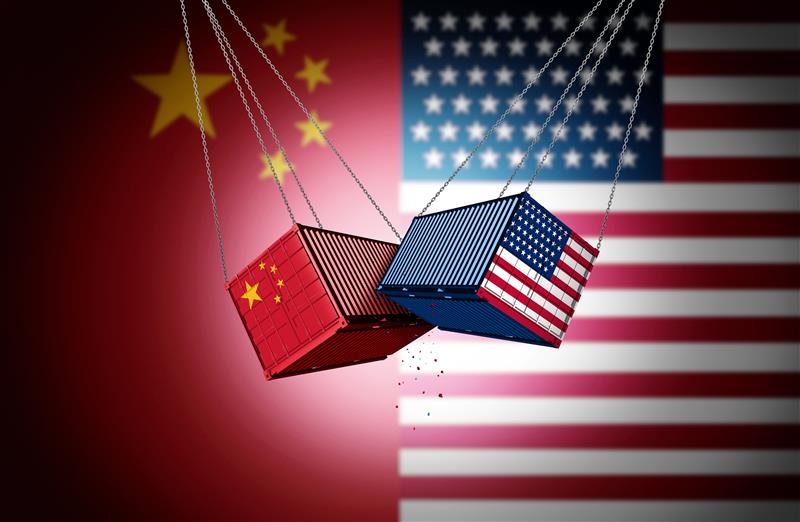Escalating Tensions in the US-China Trade War
The United States has labeled China’s retaliatory tariffs as a “big mistake,” as the global trade war sparked by President Donald Trump’s sweeping import duties shows no signs of abating. While global markets have stabilized after a period of volatility, tensions between the two economic superpowers continue to escalate.
China’s Response: Defiance Against ‘Blackmail’
Trump threatened to increase tariffs on Chinese imports to over 100%, prompting China to respond with reciprocal duties. The Chinese government dismissed the threats as “blackmail” and vowed not to back down. Unlike other Asian countries taking a more diplomatic stance, China’s rapid and aggressive response highlights its commitment to countering US trade policies. Meanwhile, the European Union remains cautious, deliberating on an appropriate response without harming its own economy.
US Treasury Secretary Criticizes China
US Treasury Secretary Scott Bessent condemned Beijing’s actions in a CNBC interview, stating that trade negotiations with other countries result from their approach to Washington, not from market turmoil.
“I think this Chinese escalation was a big mistake,” Bessent said, emphasizing that all options, including the reduction of European Union non-tariff barriers such as value-added taxes, remain on the table.
China Vows to ‘Fight to the End’
China’s Commerce Ministry responded forcefully, stating, “The US’s threat to escalate tariffs against China is a mistake on top of a mistake, once again exposing the American side’s blackmailing nature.”
In a phone conversation, European Commission President Ursula von der Leyen urged Chinese Premier Li Qiang to seek a negotiated solution and uphold fair trade principles. The EU is also considering a tracking mechanism to monitor potential trade diversions caused by US tariffs, fearing an influx of low-cost Chinese goods redirected from the US market.
Impact on Chinese Manufacturers and Global Markets
Chinese Companies Face Profit Pressure
Chinese manufacturers across various industries, from tableware to flooring, are feeling the pressure of increased tariffs. Many are exploring options to establish overseas production facilities to mitigate the impact. Investment bank Citi has revised its 2025 GDP growth forecast for China from 4.7% to 4.2%, citing rising external economic risks.
At the same time, China’s Foreign Ministry dismissed remarks by US Vice President JD Vance as “ignorant and impolite.” In a recent Fox News interview, Vance defended Trump’s tariffs while criticizing the US economic model, stating, “We borrow money from Chinese peasants to buy the things those Chinese peasants manufacture.”
Global Financial Reactions and Market Stability
US Compared to Emerging Markets
As uncertainty looms over financial markets, Euronext CEO Stéphane Boujnah suggested that the US is beginning to resemble an emerging market rather than a global economic leader.
“Fear exists all over,” Boujnah told France Inter radio. “The US, which once shared values and institutions with Europe, now resembles more of an emerging market.”
Emerging economies frequently employ targeted tariffs to shield domestic industries from foreign competition, a strategy now being mirrored by the US.
Market Recovery and Oil Price Stabilization
Stock markets rebounded on Tuesday after a period of intense selling pressure. European shares recovered from 14-month lows following four consecutive days of losses, while global oil prices stabilized after plunging to a four-year low.
US stock index futures edged higher, recovering some of the trillions of dollars lost in market value since the previous week. Despite this, economic uncertainty remains, with businesses urging the White House to reconsider its aggressive tariff strategy.
US and EU Trade Relations Amid the Crisis
Trump’s Tariffs and Industrial Strategy
Trump defended the tariffs, which impose a minimum 10% duty on all US imports, with some rates reaching 50%. He argued that these measures would help the US regain its industrial strength, which he claims has eroded due to decades of trade liberalization.
European officials signaled their willingness to negotiate a “zero-for-zero” trade deal with the US administration to prevent further escalation. However, the 27-member bloc faces difficulties in managing tariffs already imposed on automotive and metal industries, with an additional 20% tariff on select products set to take effect on Wednesday.
European Businesses Express Concern
The European pharmaceutical sector has voiced alarm over the potential impact of US tariffs. In discussions with von der Leyen, industry leaders warned that Trump’s tariff policies could accelerate the relocation of pharmaceutical production from Europe to the United States.
Vietnam and Indonesia Offer Concessions
Some of the hardest-hit countries are taking steps to negotiate relief. Vietnam, a major low-cost manufacturing hub, has requested a 45-day delay to adjust to the new US trade policies. Meanwhile, Indonesia has announced concessions for US imports, including reduced taxes on electronic goods and steel.
As the US-China trade war intensifies, both nations remain firm in their positions, escalating economic tensions worldwide. While global markets have shown some resilience, businesses and governments continue to navigate the uncertainty created by shifting trade policies. With no immediate resolution in sight, the impact of these tariffs will likely continue shaping global economic trends in the coming months.





Leave A Comment